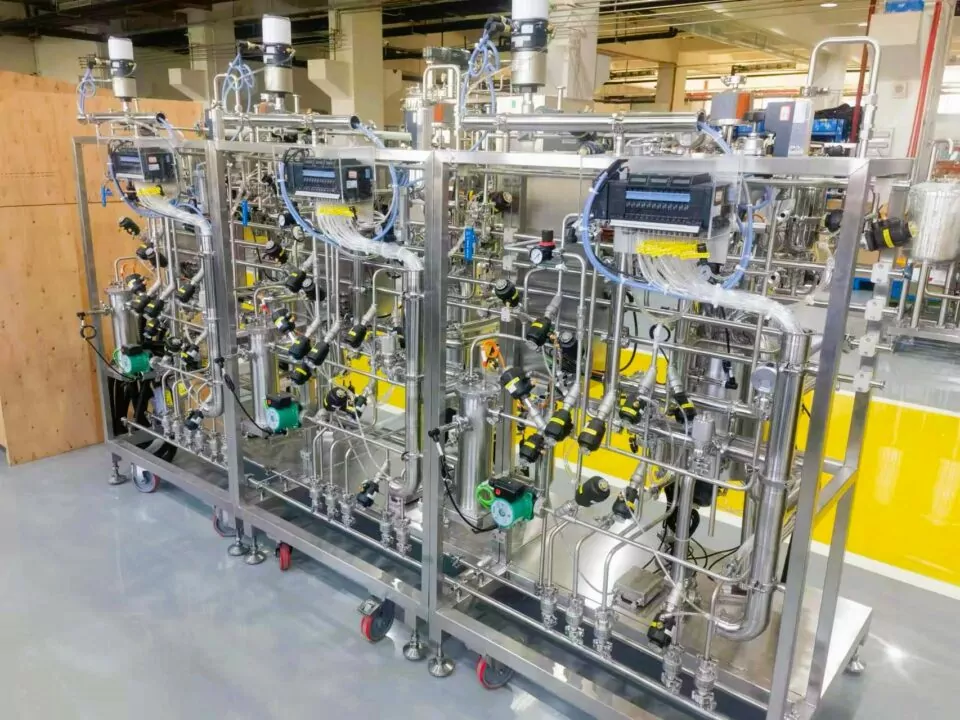
Biologics manufacturing presents several challenges due to the complex nature of biological products. These challenges encompass various stages of production, from cell line development to final product formulation. Here are some common challenges in biologics manufacturing:
- Cell Line Development: Developing a high-producing and stable cell line can be time-consuming and resource-intensive. Ensuring consistent protein expression levels is critical.
- Cell Culture: Maintaining consistent cell growth and productivity in bioreactors, especially for mammalian cell lines, can be challenging. Shear stress, nutrient limitation, and waste product buildup can affect cell viability and productivity.
- Upstream Processing: Achieving high cell density and productivity while avoiding contamination and maintaining a controlled environment are critical challenges in upstream processing.
- Downstream Processing: Purifying and isolating the target protein from a complex mixture of cellular components can be difficult. This step often involves multiple chromatography steps, which require optimization.
- Quality Control: Ensuring the quality, purity, and consistency of the biological product is paramount. This involves extensive testing, including assays for identity, potency, and safety.
- Regulatory Compliance: Biologics manufacturing is heavily regulated to ensure product safety and efficacy. Staying compliant with evolving regulatory requirements can be challenging.
- Scale-Up and Scale-Down: Transitioning from laboratory-scale to commercial-scale production (or vice versa) can lead to unforeseen challenges regarding equipment compatibility, process efficiency, and cost management.
- Supply Chain Management: Managing the supply chain for raw materials, such as cell culture media, reagents, and disposables, is crucial to avoid shortages and maintain consistent production.
- Product Stability: Ensuring the stability of biological products throughout their shelf life is a challenge, especially when dealing with temperature-sensitive proteins.
- Viral Safety: Preventing the introduction of adventitious agents, such as viruses, into biological products is critical. Robust viral clearance methods and risk mitigation strategies are necessary.
- Process Robustness: Developing a manufacturing process that is robust and resilient to variations in raw materials and process conditions is essential to ensure consistent product quality.
- Cost Control: Biologics manufacturing can be expensive due to the complexity of the processes and the need for specialized equipment. Controlling production costs while maintaining product quality is an ongoing challenge.
- Technology Advancements: Keeping up with advancements in bioprocessing technology, automation, and analytics to improve efficiency and reduce costs can be challenging.
- Environmental Impact: Minimizing the ecological footprint of biologics manufacturing, such as water usage and energy consumption, is becoming increasingly important.
- Personnel Training: Training and retaining skilled personnel experienced in biologics manufacturing processes can be challenging, as the field is highly specialized.
Addressing these challenges often requires a combination of scientific innovation, process optimization, regulatory compliance, and strategic resource allocation. Collaboration between multidisciplinary teams and staying informed about the latest developments in bioprocessing technology are essential for success in biologics manufacturing.
If you require assistance with your biological manufacturing operations, feel free to contact us by filling out the below form.
Error: Contact form not found.
by admin
I am a seasoned GxP expert and the founder and CEO of GxP Cellators, a consulting firm that provides GxP advisory and auditing services to clients across the globe. My mission is to help clients achieve excellence in quality, compliance, and remediation, and to foster a robust quality culture in their organizations.
